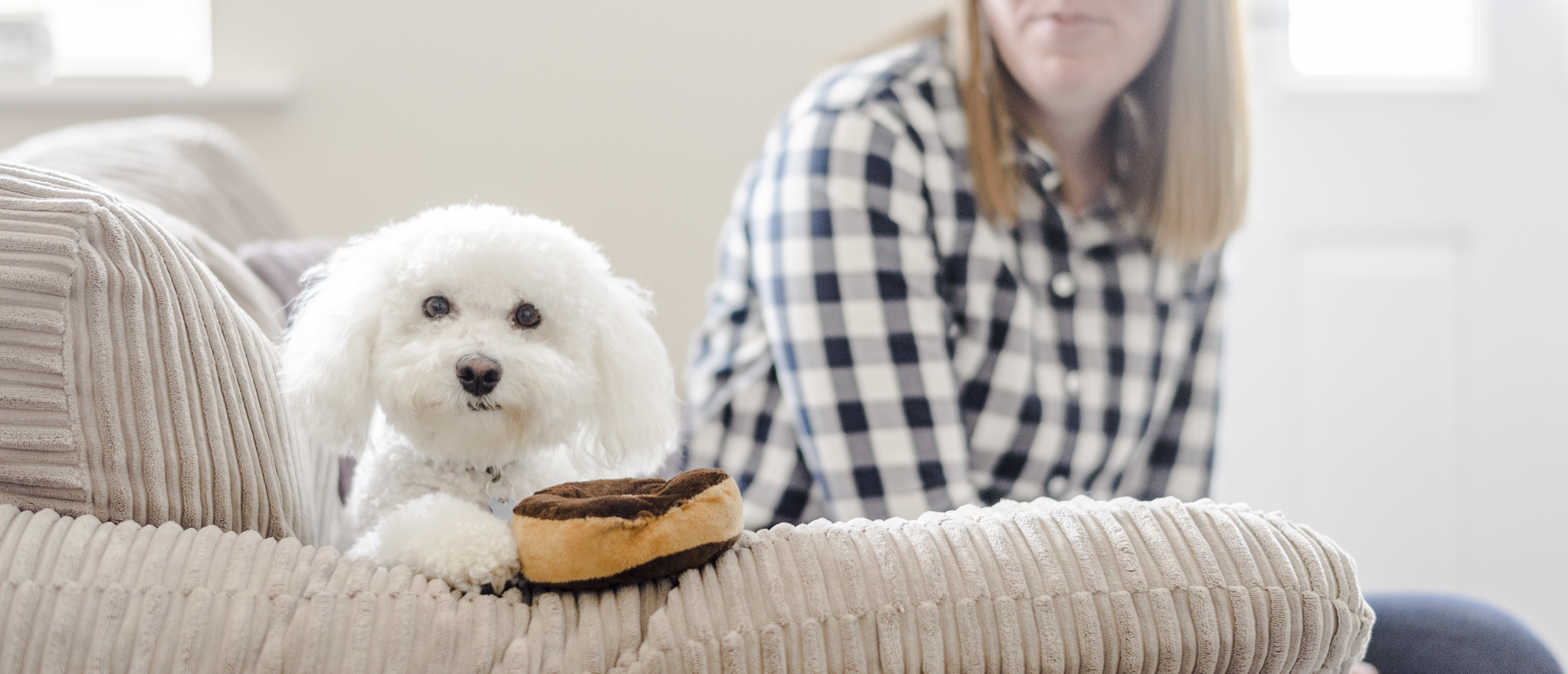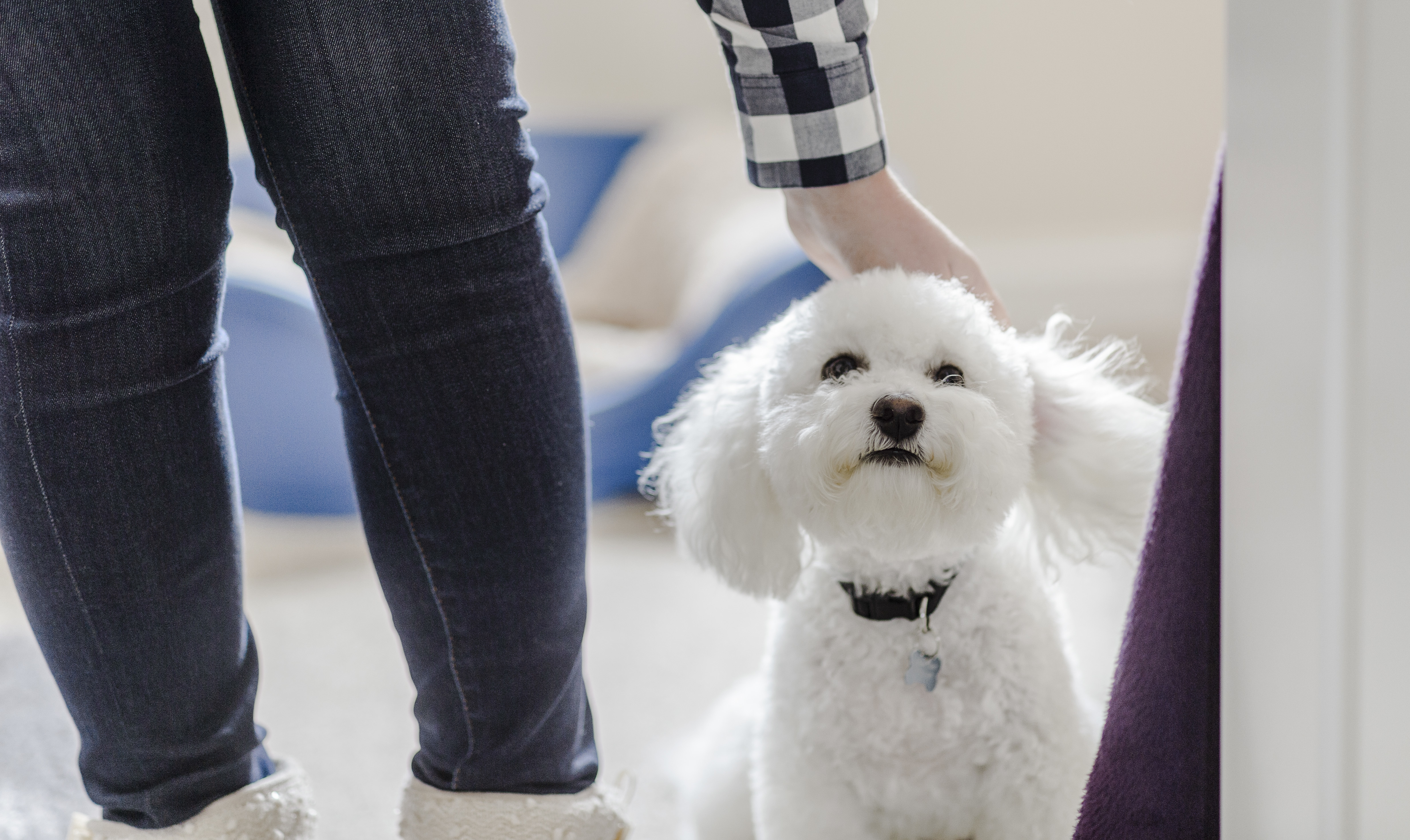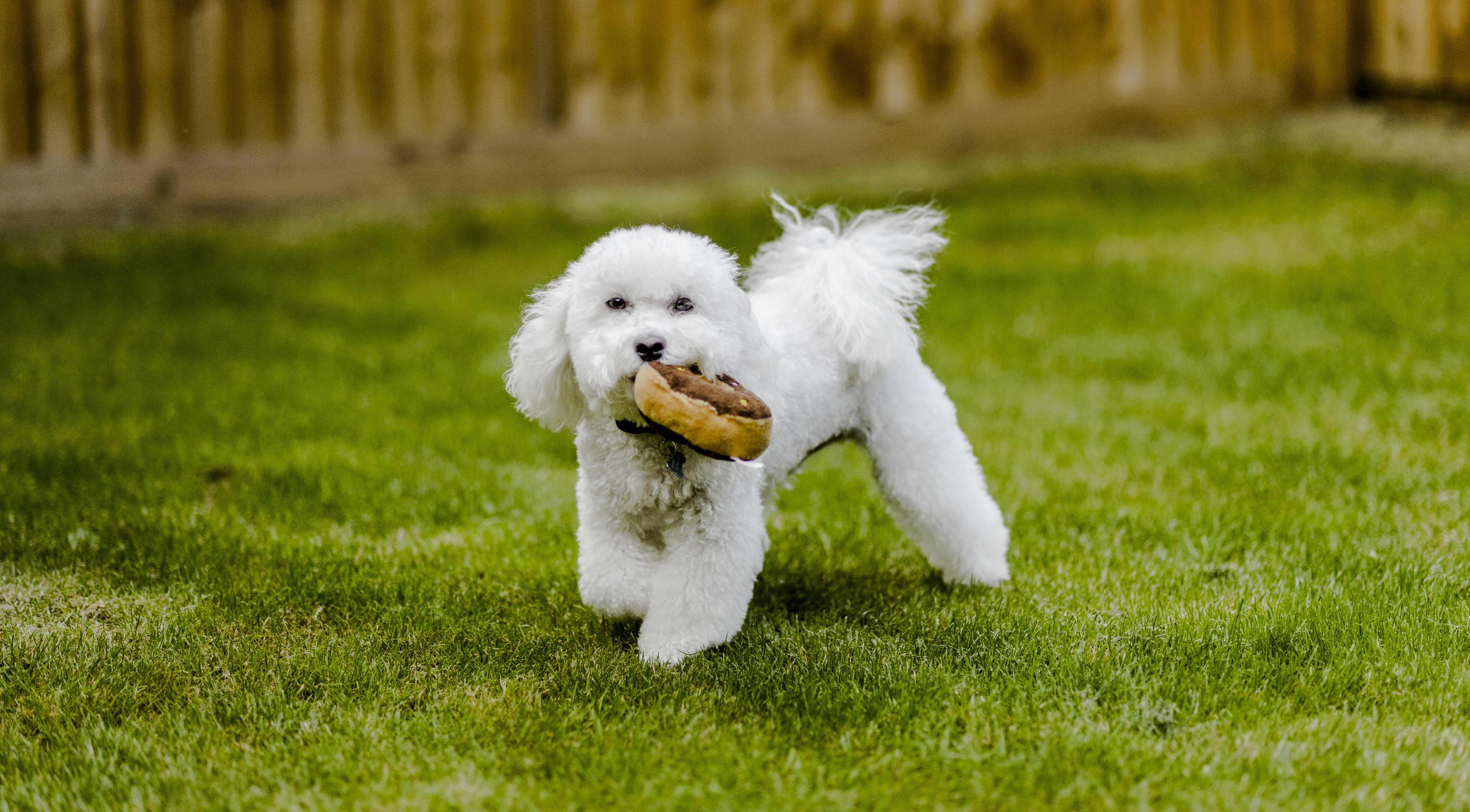Terrified former pet shop pup finds happy forever home

When Scampi’s first owner first saw the cute ball of fluff, he was in a small and dirty box with his five littermates on a shop floor.
Scampi’s parents were absent, and no adult dogs could be seen.
This was in a UK pet shop that had a licence to sell pets from the local authority.
Ellen Myring, Blue Cross Animal Welfare Assistant, said: “The shop assistant told the buyer that the puppies were between the age of 10 to 12 weeks, meaning that Scampi and his littermates would have spent a period vital to socialisation inside a shop environment and missing out on a crucial learning period that should have prepared them for later life.”
Sick pup
Shortly after being brought home from the shop, Scampi became sick and over the next few weeks visited the vet numerous times to be treated for sickness and diarrhoea.
As part of our report into the enforcement of pet breeding and sale legislation, we have accessed the inspection report for the pet shop that kept Scampi and other puppies for sale through a freedom of information request. A comment on the report states that one of the rooms that puppies are kept in “had no light”. Another of the inspector’s remarks notes: “I have suggested that [the seller] vets and meets all … breeders”; indicating that the breeders of pups sold at the premises had not been questioned about their breeding practices by the person selling them.
We cannot confirm that these are the conditions that Scampi was kept in, but are seriously concerned for the welfare of puppies being sold at these premises when the inspection took place. Without vetting a breeder, a seller of puppies cannot check that the whole canine family is well cared for or healthy enough to breed. And puppies should be kept in suitable conditions, with access to light being a minimum requirement.

Starting from scratch
When his owner could no longer cope with Scampi’s behavioural issues, they decided the best thing for the pup would be to find him a new home, and they called on us for help.
Scampi arrived at our Hertfordshire rehoming centre a very shy and timid young lad. He showed all the typical behaviours of a dog that had been severely under-socialised – he wouldn’t approach people and instead chose to curl up on his bed and wouldn’t come near anyone. It was clear that Scampi felt the world was a scary place to be in, as he had not been exposed to all the things a pet dog should consider normal and safe during a very sensitive period in his puppyhood.
We had to go right back to square one.
Because Scampi was worried by pretty much everything, we made sure he spent time with just a small number of team members so he could build up his confidence around people and begin to feel safe. As well as Ellen, Scampi became close pals with Animal Welfare Assistant Amy Koster while he was in our care. The first 10 days were spent simply forming a bond with the timid lad.
Step by step
Ellen said: “He would flinch at the tiniest movement; if my hair moved, for example. It was the same with other dogs. He would run in the opposite direction if they approached.”
On his first day, Ellen sat in the same room as Scampi but ignored him completely.
“I sat on the floor with my desktop and mouse, looking up at the computer screen,” Ellen remembered.
“I completely ignored him, while of course keeping a very close eye on him, so he could get used to my presence. I kept everything predictable to encourage him to learn normal sequences of events so he could read what might happen next. I wanted to teach him, for example, that putting my pen down signalled that I was going to stand up next.”
Taking very small steps with Scampi was essential for building his confidence.
We introduced him to different situations, people and animals, including our resident horse, and, once he was ready, took him for walks away from the centre boundaries – while all the time making sure he got lots of cuddles.
“Helping Scampi to become more confident is a very long process and it’s not just going to happen here at the centre,” Ellen added. “His new owners are going to have to work really hard to help him settle in and learn to enjoy life as a pet.”
It was a long road, but eventually Scampi was ready to look for a new home.
Why is welfare so important?
It may sound obvious, but a pet’s welfare is paramount if they are to enjoy a happy and healthy life. In particular, those early days and weeks are so important for setting an animal up for life. This period is spent with the breeder and/or the seller, so these people have a huge responsibility.
Some animals, for example dogs, have a short and crucial period where they must learn to cope with different experiences. Those caring for puppies at this stage in their development – whether that’s at our rehoming centres, or in a breeder’s care – must make sure this is a positive process. If they don’t, they risk the puppy growing into a dog who struggles to cope with life and is fearful of new things.
Pet shop and puppy farm environments do not allow puppies to develop the life skills they need, and so we believe they are wholly inadequate places for puppies to be.

Perfect match
Because Scampi’s early life had left him such a timid soul, potential owners were put off, and he was repeatedly passed by. Pets with problems are much more difficult for our teams to find homes for, and it takes a special kind of person to take a chance on a nervous dog.
Thankfully, Joanna Pratt saw Scampi’s shyness as a challenge, not an unsolvable problem.
Joanna had been searching the websites of rescue charities in the hope of finding a bichon frise who could become a companion for her grandmother.
But when she saw Scampi, a bichon-poodle crossbreed, on the Blue Cross website, she wanted him for herself!
“I’d read that he was shy, and to me it was a challenge. To see how far he has come in the six months since I’ve had him is amazing,” says Joanna.
Joanna and her mum’s first visit to meet Scampi lasted over two hours, and after letting him come up to them in our meeting room, it went so well that they took him for a walk through our sensory garden.
Before long, Scampi was ready to go home – and when he got there, he ran straight in, as if he had lived there all along!
Joanna’s family lives just around the corner and visits frequently, and he never has to want for anyone to play with him.
Joanna has been taking small steps to continue to build Scampi’s confidence, and although signs of his sheltered past remain, her hard work is paying off.
She explains: “He’ll go running over to whoever comes in the door, but as soon as they go to stroke him he does flinch, which is a sign that he’s nervous. But after that he’s fine with people.”
And Scampi’s favourite place…?
“He loves the pub!” says Joanna. “When we walk past he drags me in because the landlady gives him food. We’ve been meeting lots of people, and it’s really helped him.
“I’ve not had him very long, but I can’t imagine life without him now. It’s like he’s always been part of the family.”
Sign our pledge for change
Want better laws and enforcement to protect the welfare of pets used for breeding and sale? Sign our pledge now.






